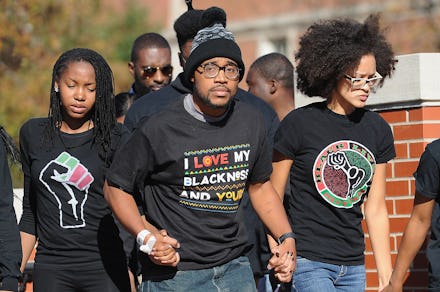One Quote Perfectly Sums Up What the Media is Missing About Campus Protests

Over the past week, there's one question that's riveted much of the media: What do we make of the University of Missouri's student activists?
After all, it's those mostly black student activists who staged a hunger strike, threatened to halt the school's juggernaut football program and forced the resignations of the school's president and chancellor for not doing enough to respond to a series of racist events on campus. But that monumental victory has been overshadowed by a long-brewing controversy over free speech on America's college campuses. It's one that played out most notably on Yale's campus, where students and faculty are still grappling with the fallout from a discussion about racist Halloween costumes.
Now, both the Atlantic and the New York Times have published pieces in which white men wax poetic about how activists like the ones in Missouri have stifled meaningful conversations about race on campus and bullied their peers into silence. The Times' Nicholas Kristof on Friday opined that ongoing student calls to address racism on campus "is sensitivity but also intolerance, and it is disproportionately an instinct on the left."
There have been rebuttals, naturally. Jelani Cobb wrote in the New Yorker that so-called attacks on free speech are a "diversion" from the real issue at hand. Gillian B. White wrote for the Atlantic that these activists are being unfairly maligned.
Jeff Chang, an author and veteran of student protests at the University of California, Berkeley, in the 1980s, during which students called for divestment from South Africa because of Apartheid, put today's conversation in historical context on Facebook:
Liberals always draw false equivalencies to equate student protests against institutional racism with the ending of free speech. As if a student calling out for an administrator to pay attention to racism is the same as an administrator dismissing that same call.
No. That's not how power works.
Students can only build power insofar as they band together — and then they can still be ignored (as they have been for years). Administrative neglect of racism defines power. Please GTFO with those stupid specious arguments about 'tyranny of the mob' and 'anti-democratic students.' This is free speech. This is what democracy looks like.
Chang is a cultural critic who lives in Berkeley, California. His first book, Can't Stop, Won't Stop: A History of the Hip-Hop Generation, offered a brief examination of student activism after the civil rights era. His most recent book, Who We Be: The Colorization of America, explores the rise, controversy and fall of multiculturalism in the United States. It's also a sobering reminder that what's happening in Missouri isn't new, and the discussion about racism on college campuses isn't going away any time soon.